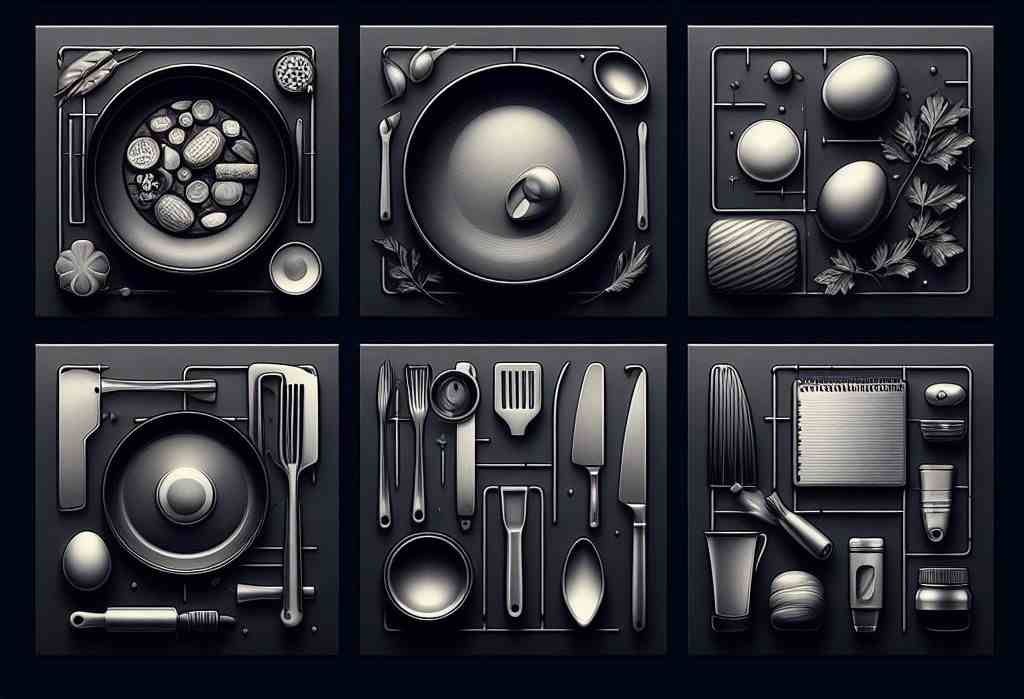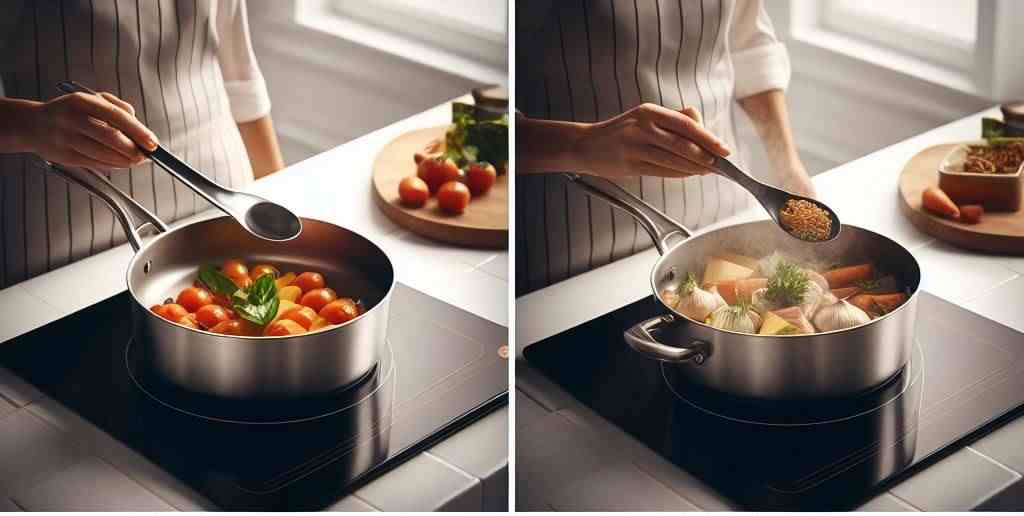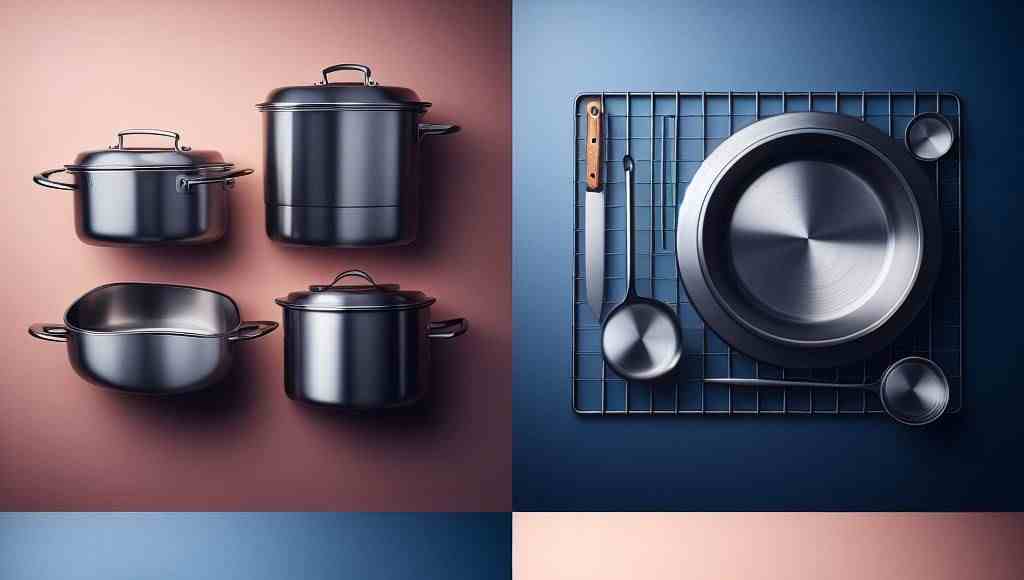Sharing is caring!
The cooking items in our kitchens like the pots, pans, and other utensils are made from a variety of materials, and one popular choice is titanium.
You might have heard of titanium because it’s strong, light, and doesn’t rust. That makes it sound great for cooking, right?
But lately, there have been some questions. Is titanium totally safe to use when we cook? Are there any hidden risks that we should know about?
We’ll dive deep into these questions in this article. We want to make sure that when you cook a meal for your family, you know exactly what’s touching your food because your health and the health of your loved ones is very important.
Why is Titanium Used in Cookware?
Titanium, commonly associated with aircraft and medical implants, has found a home in our kitchens. You might wonder why. The answer is simple: this metal is incredibly tough.
Imagine dropping your pan and instead of seeing a dent, it remains as good as new. That’s the resilience titanium offers.
Moreover, no one likes to lug around a heavy pot, especially after filling it with food. Titanium is surprisingly light.
It’s one of those metals that gives you the best of both worlds: strength without the added weight. And for anyone who’s spent hours in the kitchen, you’ll appreciate the ease that brings.
But beyond the physical benefits, there’s another reason titanium has made its mark. The metal doesn’t react with our food. Titanium doesn’t give a weird taste if you cook certain foods in them. Your tomato sauce stays tasting like tomatoes, and that’s a win in any chef’s book.
[Also read: 10 Daily Habits Of A Clean Person]
Potential Concerns and Dangers of Using Titanium In Cookware

1. Metal Leaching
Titanium itself is known for being non-reactive, but what about the scenarios where it’s alloyed with other metals?
There’s chatter out there about metals sneaking their way into our food. Titanium cookware often combines with metals like aluminum for enhanced heat conductivity.
If not manufactured properly, these other metals might interact with your food, especially during high-acid cooking.
Cooking with acidic ingredients, like tomatoes or lemons, often accelerates the leaching process in lower-quality pots and pans. You’d think titanium pans would be immune, but it largely depends on their construction.
Given that our body isn’t really thrilled about ingesting metals, this could raise health concerns over time. It’s a slow, incremental thing, so being informed about your cookware is crucial.
2. Non-Stick Coatings
Some titanium cookware comes with non-stick finishes that might house chemicals. PFOA is one such name that pops up, often linked with health concerns.
Titanium pans don’t emit fumes like traditional non-stick pans, but the chemicals in some coatings might not be entirely benign. Overheating or chipping can lead to these chemicals playing unwanted roles in your food.
3. Heat Distribution

Titanium is a champ in many areas, but heat distribution? Well, that’s not its strongest suit. Uneven heating can lead to hot spots on your pan.
Imagine one half of your pancake getting that perfect golden hue, while the other half looks pale and undercooked.
This isn’t just about perfecting your breakfast. Uneven heating could end up overcooking or undercooking parts of your meal, which is neither tasty nor always safe.
To counter this, many manufacturers mix titanium with metals like aluminum. Some pans manage this blend seamlessly, while others don’t balance out.
[Also read: Top 8 Sour Foods You Probably Didn’t Know]
4. Allergies
It’s rare, but some people have titanium allergies. And if you’re one of those unique people, then titanium cookware might not be your kitchen option.
Symptoms might include skin rashes, itching, or redness. And while it’s more commonly seen in scenarios like titanium implants, it’s something to consider.
Now, you’re probably thinking, “But I’m not eating the pan!” True, but remember those spoons and spatulas that constantly scrape the bottom might introduce tiny titanium particles into your food.
Benefits of Titanium Cookware

1. Strength and Durability
You know how some cookware gets scratched, dented, or just plain old falls apart after a while? Not titanium. This stuff is like the superhero of metals. Drop it, scrape it, or use it daily – titanium takes a beating and still looks brand new.
This means you won’t be running to the store every couple of years looking for replacements. Investing in a set of titanium pots and pans could be a long-term relationship.
2. Lightweight
Imagine trying to flip a pancake or sauté some veggies. Now imagine doing that with a pan that feels like you’re lifting weights at the gym. Doesn’t sound fun, does it? This is where titanium comes into play. It’s super light.
Handling it is a breeze, making those kitchen maneuvers feel like you’re dancing. Whether you’re a pro in the kitchen or just starting, a lightweight pan can make a world of difference.
3. Non-Reactive Nature
So, we’ve touched on this a bit before, but it’s worth diving deeper. Metals reacting with food? Not a tasty combo. But with titanium, that’s not a concern.
Your food remains uncontaminated by the cookware. That means your tangy tomato soup or lemony risotto retains its pure flavor.
4. Low Maintenance
Here’s a bonus for everyone who dislikes the cleanup part of cooking (let’s face it, most of us). Titanium is pretty low maintenance. It doesn’t rust. It doesn’t stain.
And given its sturdy nature, you don’t have to tiptoe around it, fearing scratches.
A quick wash, a little dry, and it’s ready to go again. And for those days when you’re feeling lazy? Many titanium cookware pieces are dishwasher friendly.
[Also read: How to Clean And Prep A Coconut]
Tips for Safe Use of Titanium Cookware

1. Know What You’re Buying
Not all titanium cookware is created equal. Some might be pure titanium, while others could be titanium-coated.
Pure titanium cookware offers all the benefits we’ve been raving about – durability, lightweight, and non-reactiveness.
On the other hand, titanium-coated means there’s another material lurking underneath. And that material might not share titanium’s stellar qualities. So, always check labels and product details.
2. Avoid High Heat
Titanium is tough, but that doesn’t mean you should crank up the heat to the max every time. Uneven heat distribution can sometimes be an issue with these pans. So, avoid exposing them to super high temperatures.
Instead, a medium to medium-high setting will do the trick for most dishes. This not only ensures your food cooks evenly but also extends the lifespan of your cookware.
3. Utensil Choices Matter
Titanium is resistant to scratches, but using metal utensils can still cause some wear over time. Instead, consider using wooden or silicone utensils.
These are gentler on the cookware surface and ensure your titanium pans stay in top-notch condition for longer. Plus, there’s something satisfying about the sound of wooden spoons against a pan.
4. Cleaning Care
Avoid abrasive scrubbers; they’re overkill for this kind of cookware. A soft sponge and some dish soap will do the trick for most messes. For stubborn spots, let the pan soak a bit before cleaning.
And here’s a pro tip: dry it immediately after washing. While titanium doesn’t rust, water spots can be a bummer. Keeping it dry ensures it stays looking as good as new.
5. Storage
You’ve invested in this awesome cookware, so keep it safe. Avoid stacking them directly on top of each other. If you must stack due to space constraints, consider placing a soft cloth between pans.
This simple step can prevent unnecessary wear and keep your titanium looking and performing at its best.
[Also read: 5 Foods That Naturally Staves Off Dementia, According to Science]
Conclusion
Titanium is popular for a reason. It’s strong and doesn’t wear out easily. But like with all things, it’s important to be careful and make sure we’re using it the right way.
The good news is that with a little bit of knowledge and attention, we can keep our kitchens safe and our food tasty.
It’s always a good idea to ask questions and learn about what we use in our homes, especially in our kitchens. It’s clear that while titanium has some great benefits, it’s always good to be aware of any concerns.
FAQs
What is the healthiest metal for cookware?
Choosing the healthiest metal for cookware depends on a few factors, like how you’re using it and what you’re cooking.
Generally, stainless steel is a top pick. It’s non-reactive, meaning it won’t leach chemicals into your food, and it’s durable, so it can handle a lot of wear and tear.
Cast iron is another good choice, especially if you’re looking for non-stick without the chemical coating. Just remember, with cast iron, you’ve got to keep it seasoned to maintain its non-stick properties.
Is titanium better than aluminum for cooking?
Both titanium and aluminum have their merits, but there are some differences. Titanium, as we’ve been discussing, is super durable and lightweight. It won’t react with your food, making it a safer choice in that aspect.
Aluminum, on the other hand, is an excellent heat conductor, ensuring even cooking. However, there’s been some chatter about aluminum’s safety, especially if it’s untreated.
Some worry about it reacting with acidic foods, potentially leading to leaching. So, if you lean towards aluminum, maybe consider anodized versions which are more stable.
What is titanium cookware made of?
Titanium cookware, at its core, is made of titanium. Now, some pots and pans are pure titanium, which means they bring all the benefits of this metal to your kitchen. But some are just titanium-coated.
That means there’s another material underneath, often aluminum or steel. So, when shopping, it’s essential to know if you’re getting the whole loaf or just a slice.
Are there any potential health risks with titanium cookware?
Titanium itself is considered non-toxic and is often used in medical implants because of its biocompatibility. So, the chances of it causing any harm when used in cookware are pretty slim.
However, if we’re talking about titanium-coated cookware, it’s crucial to consider the underlying material. If it’s something that could react with food or degrade over time, then there might be some concerns.
Always do a little research and make sure you’re investing in high-quality products.
- All photos from freepik.com
Sharing is caring!
